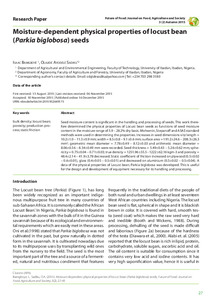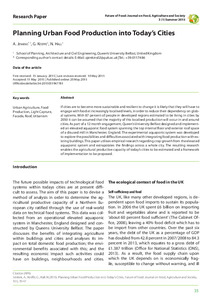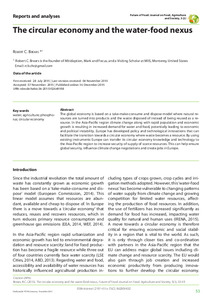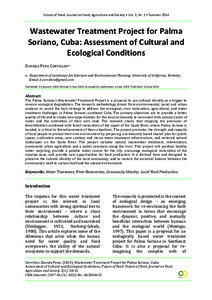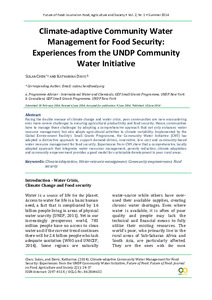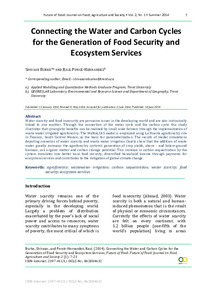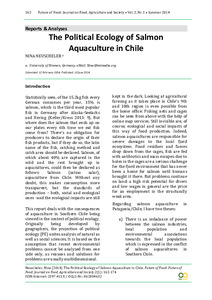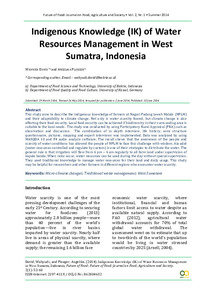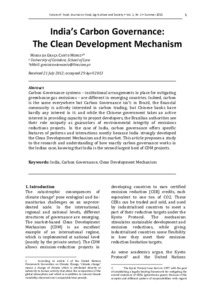Suche
Anzeige der Dokumente 41-50 von 109
Aufsatz
 Moisture-dependent physical properties of locust bean (Parkia biglobosa) seeds
Moisture-dependent physical properties of locust bean (Parkia biglobosa) seeds
(Department of Organic Food Quality and Food Culture at the University of Kassel, Germany and Federation of German Scientists (VDW), 2015-12-16)
Seed moisture content is significant in the handling and processing of seeds. This work therefore determined the physical properties of Locust bean seeds as functions of seed moisture content in the moisture range of 5.9 – 28.2% dry basis. Mohsenin, Stepanoff and ASAE standard methods were used in determining the properties. Increases in seed dimensions vitz length = 10.2±1.0 – 11.3±0.9 mm; width = 8.5±0.8 – 9.1±0.6 mm; surface area = 191.2±24.6 – 208.3±26.3 mm2 ; geometric mean diameter = 7.78±0.49 – 8.12±0.03 and ...
Aufsatz
 Planning Urban Food Production into Today's Cities
Planning Urban Food Production into Today's Cities
(Department of Organic Food Quality and Food Culture at the University of Kassel, Germany and Federation of German Scientists (VDW), 2015-05-20)
If cities are to become more sustainable and resilient to change it is likely that they will have to engage with food at increasingly localised levels, in order to reduce their dependency on global systems. With 87 percent of people in developed regions estimated to be living in cities by 2050 it can be assumed that the majority of this localised production will occur in and around cities. As part of a 12 month engagement, Queen’s University Belfast designed and implemented an elevated aquaponic food system spanning ...
Aufsatz
 The circular economy and the water-food nexus
The circular economy and the water-food nexus
(Department of Organic Food Quality and Food Culture at the University of Kassel, Germany and Federation of German Scientists (VDW), 2015-12-16)
The global economy is based on a take-make-consume and dispose model where natural resources are turned into products and the waste disposed of instead of being reused as a resource. In the Asia-Pacific region climate change along with rapid population and economic growth is resulting in increased demand for water and food, potentially leading to economic and political instability. Europe has developed policy and technological innovations that can facilitate the transition towards a circular economy where waste becomes ...
Aufsatz
 Wastewater Treatment Project for Palma Soriano, Cuba: Assessment of Cultural and Ecological Conditions
Wastewater Treatment Project for Palma Soriano, Cuba: Assessment of Cultural and Ecological Conditions
(Department of Organic Food Quality and Food Culture at the University of Kassel, Germany and Federation of German Scientists (VDW), 2014-06-10)
The Palma Project is an experiment in the use of cultural identity as a social trigger to address ecological degradation. The research methodology draws from environmental, social and urban analyses to unveil the best strategy to address the ecological, river restoration and water treatment challenges in Berkeley, California’s “Sister City” in southeast Cuba, Palma Soriano. The objective is to provide a better quality of life and to create new opportunities for the local community to reconnect with natural cycles ...
Aufsatz
 Climate-Adaptive Community Water Management for Food Security: Experiences from the UNDP Community Water Initiative
Climate-Adaptive Community Water Management for Food Security: Experiences from the UNDP Community Water Initiative
(Department of Organic Food Quality and Food Culture at the University of Kassel, Germany and Federation of German Scientists (VDW), 2014-06-10)
Facing the double menace of climate change threats and water crisis, poor communities have now encountered ever more severe challenges in ensuring agricultural productivity and food security. Communities hence have to manage these challenges by adopting a comprehensive approach that not only enhances water resource management, but also adapts agricultural activities to climate variability. Implemented by the Global Environment Facility’s Small Grants Programme, the Community Water Initiative (CWI) has adopted a ...
Aufsatz
 Connecting the Water and Carbon Cycles for the Generation of Food Security and Ecosystem Services
Connecting the Water and Carbon Cycles for the Generation of Food Security and Ecosystem Services
(Department of Organic Food Quality and Food Culture at the University of Kassel, Germany and Federation of German Scientists (VDW), 2014-06-10)
Water scarcity and food insecurity are pervasive issues in the developing world and are also intrinsically linked to one another. Through the connection of the water cycle and the carbon cycle this study illustrates that synergistic benefits can be realized by small scale farmers through the implementation of waste water irrigated agroforestry. The WaNuLCAS model is employed using La Huerta agroforestry site in Texcoco, South Central Mexico, as the basis for parameterization. The results of model simulations depicting ...
Aufsatz
 The Political Ecology of Salmon Aquaculture in Chile
The Political Ecology of Salmon Aquaculture in Chile
(Department of Organic Food Quality and Food Culture at the University of Kassel, Germany and Federation of German Scientists (VDW), 2014-06-10)
Every German consumes per year, 15% is salmon, which is the third most popular fish in Germany after Alaska-Seelachs and Hering (Keller/Kress 2013: 9). But where does the salmon that ends up on our plates every 6th time we eat fish come from? There's no obligation for producers to declare the origin of their fish products, but if they do so, the latin name of the fish, catching method and catch area should be declared. Salmon, of which about 40% are captured in the wild and the rest brought up in aquacultures, could ...
Aufsatz
 Water for Food: International Narratives Sidelining Alternative Views
Water for Food: International Narratives Sidelining Alternative Views
(Department of Organic Food Quality and Food Culture at the University of Kassel, Germany and Federation of German Scientists (VDW), 2014-06-10)
Aufsatz
 Indigenous Knowledge (IK) of Water Resources Management in West Sumatra, Indonesia
Indigenous Knowledge (IK) of Water Resources Management in West Sumatra, Indonesia
(Department of Organic Food Quality and Food Culture at the University of Kassel, Germany and Federation of German Scientists (VDW), 2014-06-10)
This study was aim to describe the indigenous knowledge of farmers at Nagari Padang laweh Malalo (NPLM) and their adaptability to climate change. Not only the water scarcity is feared, but climate change is also affecting their food security. Local food security can be achieved if biodiversity in their surrounding area is suitable to the local needs. The study was conducted by using Participatory Rural Appraisal (PRA) such as observation and discussion. The combination of in depth interview, life history, semi structure ...
Aufsatz
 India’s Carbon Governance: The Clean Development Mechanism
India’s Carbon Governance: The Clean Development Mechanism
(Department of Organic Food Quality and Food Culture at the University of Kassel, Germany and Federation of German Scientists (VDW), 2013-04-29)
Carbon Governance systems – institutional arrangements in place for mitigating greenhouse gas emissions – are different in emerging countries. Indeed, carbon is the same everywhere but Carbon Governance isn’t: in Brazil, the financial community is actively interested in carbon trading, but Chinese banks have hardly any interest in it; and while the Chinese government takes an active interest in providing capacity to project developers, the Brazilian authorities see their role uniquely as guarantors of environmental ...

